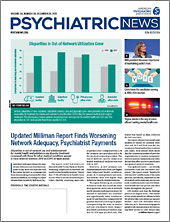Mental health treatment plans—documents that detail a patient’s health history, psychiatric complaints, and steps of treatment—can be valuable tools to build a good physician-patient relationship. For psychiatrists at community mental health centers, however, treatment plans—which are required to receive reimbursement from the Centers for Medicare and Medicaid Services (CMS)—amount to stress-inducing, unwieldy administrative tasks that divert limited resources away from patients.
Such was the take-home message from the session “Treatment Plans—Necessary Documents or Undue Administrative Burden?” at this year’s IPS: The Mental Health Services Conference, held in October in New York City.
The session, hosted by members of the American Association of Community Psychiatrists (AACP), encouraged psychiatrists to advocate for research-backed changes to CMS’s treatment plan requirements.
The mandated use of treatment plans for patients covered by CMS emerged from the 1971 Wyatt v. Stickney case in Alabama, explained Diana Dragatsi, M.D., the associate clinical director of Rockland Psychiatric Center in Orangeburg, N.Y. A federal court ruled that patients with mental illness who were committed to a psychiatric institution have a constitutional right to care that provides a realistic opportunity to return to society. One of the conditions the court ruled was fundamental to adequate and effective care in a public mental health institution was an individualized treatment plan. On the heels of that decision, CMS began requiring treatment plans for reimbursement.
As the large state mental hospitals were closed down in favor of providing care via community mental health centers, the community psychiatrists took on many Medicaid patients and the burden of filling out these plans. Mental health treatment plans are completed at the onset of treatment so patients can better understand the stages of treatment, timeframes for recovery, and potential risks.
Isabel Norian, M.D., a psychiatrist and former director of the Center for Life Management in Derry, N.H., said that in principle a treatment plan should be relatively short, straightforward, and written in a way a patient can understand. But for CMS reimbursement purposes, these documents need to be written using administrative language and include many possible scenarios in case a patient’s symptoms evolve or change. In addition, as a separate administrative document, treatment plans are usually not integrated into the regular medical record, so work is duplicated. Some electronic health record systems offer treatment plan templates, but such templates can be costly for community clinics, the panelists said.
“As treatment plans have morphed into vehicles for payment authorization, they have detracted from our ability to be effective healers,” Dragatsi said. Additionally, she noted, there is no evidence to suggest these detailed treatment plans improve patient outcomes or reduce costs. So, what can be done to reduce this burden?
A recent AACP position statement offers some steps toward reducing the clinical burden of treatment plan documents. The AACP statement was based on a 2017 position paper from the American College of Physicians on how to reduce administrative medical tasks and was co-written by Dragatsi, Norian, and fellow panelist Kenneth Minkoff, M.D. The recommendations included the following:
•
Eliminate the need to formally document in a treatment plan any services that can be provided in a comparable medical setting—such as primary care—in which a treatment plan is not required.
•
Eliminate treatment plans as the major vehicle for determining whether services are authorized for payment. Reimbursement documentation should be simplified and disconnected from a treatment plan whenever feasible.
•
Convene a national collaborative of stakeholders to review all the required documentation for a mental health treatment plan. The review should make specific recommendations for changes and propose pilot studies to determine whether suggested changes might improve clinical efficiency.
Psychiatrists should also reach out to funding agencies such as the Substance Abuse and Mental Health Services Administration to see if there is any opportunity for a mental health clinic to conduct a pilot study on the effectiveness of treatment plans, suggested Minkoff, a clinical assistant professor of psychiatry at Harvard Medical School.
“Change is not going to happen overnight, but we have done nothing for more than 30 years, so we better get going,” Minkoff said. ■
The position statement “Putting Patients First by Improving Treatment Planning and Reducing Administrative and Clinical Burden of Treatment Plan Documentation” is posted
here.

